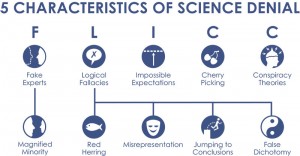Guest post from John Cook, University of Queensland
For many years, RealClimate has been educating the public about climate science. The value of climate scientists patiently explaining the science and rebutting misinformation directly with the public cannot be overestimated. When I began investigating this issue, my initial searches led me here, which was invaluable in increasing my understanding of our climate and making sense of misinformation. RealClimate has inspired and empowered a host of climate communicators such as myself to step forward and help make climate science more accessible to the general public.
To further the work of educating the public, and empowering people to communicate the realities of climate change, the Skeptical Science team has collaborated with The University of Queensland to develop a MOOC, Making Sense of Climate Science Denial. MOOC stands for Massive (we’ve already had thousands of students sign up from over 130 countries) Open (available for free to everyone) Online (web-based, no software required) Course.
The course examines the science of climate science denial. Why do a small but vocal minority reject the scientific evidence for climate change? What techniques do they use to cast doubt on the science? And we examine the all-important question – based on scientific research, how should we respond to science denial?
Several strands of research in cognitive psychology, educational research and a branch of psychology called “inoculation theory” all point the way to neutralising the influence of science denial. The approach is two-fold: communicate the science but also explain how that science can be distorted.
So our course looks at the most common climate myths you’re likely to encounter online or in the media. We examine myths casting doubt on the reality of global warming. We explore the many human fingerprints on climate change. We look at the messages from past climate change and what climate models tell us about the future. And we look at how climate change is impacting every part of society and the environment. As we examine myths touching on all these parts of climate science, we shine the spotlight on the fallacies and techniques used to distort the science.
As well as our short video lectures debunking climate myths, we also interviewed many of the world’s leading scientists. I had the privilege to speak to Ben Santer, Katharine Hayhoe, Richard Alley, Phil Jones, Naomi Oreskes and let’s not forget my long, fascinating conversation with Michael Mann. I was also lucky enough to interview Sir David Attenborough at the Great Barrier Reef. We spoke to both climate scientists and social scientists who study the psychology of climate science denial. Some of the most powerful moments from those interviews came when the scientists described the attacks they’d personally experienced because of their climate research:
Our MOOC starts next Tuesday, April 28. It’s a free online course hosted by the not-for-profit edX (founded by Harvard University & MIT). It runs for 7 weeks, requiring 1 to 2 hours per week. You can enroll at http://edx.org/understanding-climate-denial.

Such a useful course, and systematization of denial tactics.Thank you!
One thought — the distinguishing characteristics in your illustration
https://www.realclimate.org/images//FLICC1-300×156.jpg
apply to some active promoters of the ‘pocalypse variety as well.
The same cure applies.
I’ve found this useful:
https://davidbrin.wordpress.com/2011/10/12/arguing-with-your-crazy-uncle-about-climate-change/
Following up my post just above — Gavin has posted half a dozen inline responses about the methane emergency stuff, notably from Carana. Search will find those here. See also Fractal Planet. It’s important to discuss science denial as it’s being used for greenwashing claims like those of the methane emergency drill-and-burn-faster advocates.
Will this MOOC be repeated ?
Is there a possibility of an addendum discussing laws and legislation, and public action ? I mention this because of:
https://legiscan.com/WY/text/SF0012/id/1151882
This is a recent law from Wisconsin:
“AN ACT relating to crimes and offenses; creating the crimes of trespassing to unlawfully collect resource data and unlawful collection of resource data; limiting use of unlawfully collected data; providing for expungement …”
“(iv) “Resource data” means data relating to land or land use, including but not limited to data regarding agriculture, minerals, geology, history, cultural artifacts, archeology, air, water, soil, conservation, habitat, vegetation or animal species.”
This reminds me of the attempt by Chinese officials to suppress air quality measurements:
http://www.reuters.com/article/2012/06/06/us-china-environment-idUSBRE85408S20120606
and i can imagine Indonesian interests attempting to pass similar legislation on observations of deforestation, or the state of Florida repeating North Carolina follies on sea level rise.
A module on citizen action might be in order.
sidd
Thanks to John Cook et al.
“Skeptical Science is affiliated with no political, business, or charitable entity. The site does not contain banner ads and is funded entirely by Cook himself, with reader donations. All regular and guest authors contribute strictly voluntarily.”
http://en.wikipedia.org/wiki/Skeptical_Science
http://www.yaleclimateconnections.org/2010/12/skeptical-science-founder-john-cook/
http://blogs.agu.org/sciencecommunication/2010/12/01/qa-with-john-cook/
http://iopscience.iop.org/1748-9326/8/2/024024/
Sidd:
12 May 2015 at 12:21 PM
That’s a great idea. It will take a lot to make the world safe for citizen science. No good deed goes unpunished.
But my senses are already taking all the punishment they can handle. And I’m not even E.T.
In what you cite, “but not limited to” is like an inverse bill of rights (“…creating…crimes relating to…but not limited to…”).
“AN ACT” is words too good. It’s AN ABROGATION. It’s a king’s forest law.
Are thinkless-tanks writing templates for pieces of legislation like this?